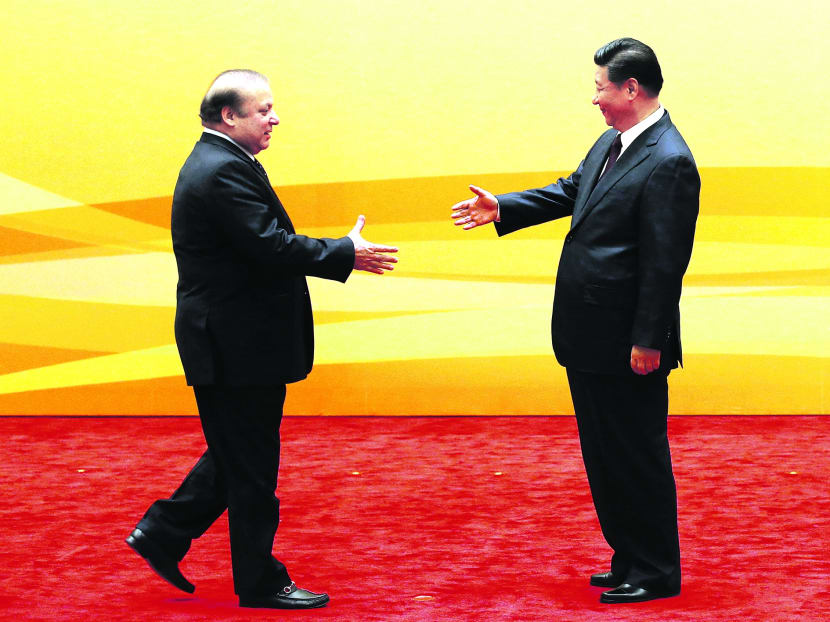Pakistan wants to become China’s newest superhighway to Europe
HONG KONG — Over some of the world’s tallest peaks, across disputed terrain and through an insurgency that has killed more than 50,000 people lies what Pakistan hopes will be China’s newest route to Europe and beyond.

China's President Xi Jinping (R) shakes hands with Pakistan's Prime Minister Nawaz Sharif at a meeting in Beijing last year. Reuters file photo
HONG KONG — Over some of the world’s tallest peaks, across disputed terrain and through an insurgency that has killed more than 50,000 people lies what Pakistan hopes will be China’s newest route to Europe and beyond.
Pakistan and China will announce more than two dozen deals when President Xi Jinping visits this year, Planning Minister Ahsan Iqbal said in an interview. The 3,000km economic corridor will start in China’s western region of Xinjiang and run to Gwadar, a Chinese-funded port on the Arabian Sea.
“For the first time China is going to become a strategic economic partner of Pakistan,” Mr Iqbal, who travelled to China last month, said on Monday (March 30) at his office in Islamabad. “Gwadar is the shortest link to Europe, Africa and Middle East,” he added, calling it “a very attractive proposition for China and for its competitiveness”.
The move represents a shift toward greater economic cooperation between Pakistan and China, which have long had close security ties amid common disputes with neighbouring India. The corridor would give China access to the Indian Ocean and lead to investments that would help ease power shortages that are hindering economic growth in Pakistan.
“As an economic power China keeps on expanding,” said Mr Talat Masood, a former Pakistani army official. “India is worried. The US and the West is worried.”
OIL, RAILWAYS
Prime Minister Nawaz Sharif’s government has approved a proposal to buy eight Chinese submarines and a deal may be signed during Mr Xi’s visit, Mr Rohael Asghar, chairman of a parliamentary panel on defence, said yesterday. Naval officials have selected two companies after visiting China, he said, declining to name them.
The economic corridor was first announced in July 2013, and officials from China and Pakistan are still negotiating the final details, Mr Iqbal said. Key among them are an oil and gas pipeline, highways, railways and about 3,000 megawatts of coal, solar and wind power, which would help Pakistan end persistent blackouts that deter investors.
Pakistan plans to train over 12,000 security personnel and form a “special division” to protect Chinese workers on the corridor, the Express Tribune reported last Monday, without saying where it got the information.
TOP PRIORITY
The dates for Mr Xi’s trip haven’t been announced. He cancelled a visit last September after anti-government protesters took over parts of Islamabad to pressure Mr Sharif to resign.
Shortly after taking power in 2013, Mr Sharif won a US$6.6 billion (S$9 billion) loan from the International Monetary Fund to avoid a balance-of-payments crisis. Lower oil prices, higher remittances and increased consumer spending are pushing growth toward a seven-year high of 4.3 per cent in the current fiscal year.
“Energy is the top priority because right now Pakistan’s economy is very much constrained due to power shortages,” Mr Iqbal said. “If we have enough power, the growth rate will immediately jump.”
Moody’s Investors Service said last month that the economic corridor is credit positive for Pakistan because it will spur investment and boost trade flows. China has been Pakistan’s largest trade partner for four consecutive years with US$15 billion in 2013, surpassing the US and the United Arab Emirates (UAE), according to data compiled by Bloomberg.
DISPUTED TERRITORY
The corridor will run through Gilgit-Baltistan, parts of which belong to territory claimed by India. The two nations have fought three of their four wars over the Kashmir region since partition in 1947.
Mr Iqbal called on India to resolve the Kashmir dispute peacefully so the region could prosper. Talks between the nations have stalled over border flare-ups and disagreements over government protocol.
“There’s no alternative to peace and negotiations and having good relations with neighbours,” Mr Iqbal said.
China on Saturday released a 50-point action plan that fleshed out its plans to build trade routes to Europe by land and sea. Along with the Pakistan corridor, China also wants to build one through Bangladesh, India and Myanmar.
“The economic corridor will enhance connectivity between China, the Indian Ocean economy and the West via Pakistan, spur regional growth and create fertile ground for investment,” said Professor Shi Yinhong, professor of International Relations at Renmin University in Beijing and an adviser to China’s State Council.
Pakistan’s power outages can last as long as 18hrs a day in some areas. Blackouts have sparked violent street protests, shut factories in the past and were a key reason for the defeat of former president Asif Ali Zardari’s party in 2013.
Pakistan plans to set up economic zones in the corridor to process minerals and develop industrial cities, Mr Iqbal said. The country of 196 million people has South Asia’s fastest population growth rate, making job creation crucial for Mr Sharif.
“The framework of Pakistan-China friendship will have a paradigm shift,” Mr Iqbal said. “This is the year when physical work will start.” BLOOMBERG






